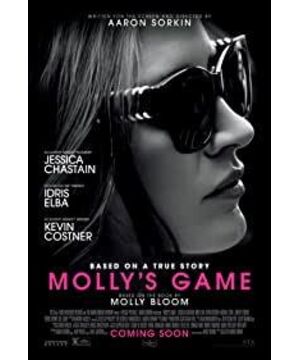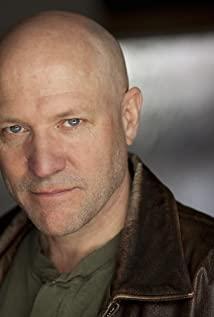Filming location: YVR-the 5th Avenue Cineplex Normal 2D 4/5 stars, 7/10 points This
film is not a biopic about a woman's autonomous awakening, on the contrary, it is about the independent struggle history of an uneasy woman , But this independent existence was completely defeated and failed in a world dominated by male power. Molly Bloom (Jessica Chastain), a talented skier who retired due to an accident, was taken step by step into the world of men's rights in card gambling, building his own gambling empire step by step, and stepping toward his own collapse.
As the first film directed by Aaron Sorki, this film still maintains its usual style-quick and fierce dialogue, unbridled story progress, rich metaphoric refracted background and story advancement; the identity of the director will undoubtedly make this film useful The "convergence" is reflected in the small scale of production costs, the promotion of entertainment themes, and the restrictions on the selection of casts. However, the soul of Sorkin style and the maintenance of its screenwriter identity make the film still maintain its unique Sorkin. Label. And whether this label is a style shackles and lacks surprises, or is it a golden sign that attracts the attention of film critics and audiences, or the superposition of the two, it depends on how the story is presented.
Many people will take Moneyball (2011) as an analogy, which is undoubtedly well-founded: it is also in the entertainment industry, and it is also co-written by Sorkin, and it also tells a story biography of a person. But if you start from the perspective of the story dimension and temporarily forget about style participation, to a certain extent, Goodfellas (1990) is undoubtedly a better choice: to seek the true meaning of survival in the turmoil. Of course, this analogy does not fit perfectly. In terms of style, vertical and previous comparisons, Molly's fast speech and logic are as self-consistent as the female version of Zuckerberg. Of course, this was before she faced a trough; after being frustrated, she seemed to have CJ (The West Wing) The shadow of, especially the picture of a person flipping through a book in the office, resembles the angle of CJ's contemplation in the office after frustration. Horizontal comparison, His Girl Friday is undoubtedly a wonderful choice. Thanks to Manhola Dargis (New York Times special film critic) for the wonderful summary:
"… suggests that Mr. Sorkin wrote and directed his movie with a stopwatch in one hand and a DVD of Howard Hawks's motor-mouth comedy'His Girl Friday' in the other. His Girl Friday (1940) has been clocked at 240 words per minute, which sounds about right for the tempo Mr. Sorkin has embraced in "Molly's Game."
to "... imply Sorkin shot the film in writing, (as) One hand holds a stopwatch, and the other holds Howard Hawks' "Motor Speed" comedy His Girl Friday. The speech rate in HGF is 240 words per minute, which is similar to the speech rate set by Sorkin for this film. "
In the performance of actors, Jessica Chastain is undoubtedly excellent, but her similar performance experience (for example, Miss Sloane, coincidentally the background experience of Molly and Sloane has overlapped), while complimenting people, lost the breathtaking taste. Nominations followed, but in the fierce competition for female performances this year, it is inevitable to lose to the new generation of Saoirse Ronan (Lady Bird, 2017) or Frances McDormand, who has won the Oscar with Fargo (1996), or popular figure Sally Hawkins. In terms of actors, the lawyer played by Idris Elba and the father played by Costner have all accomplished their tasks well. But not all actors have reached their level, especially Michael Cera's Player X, which makes people feel itchy and dragging their feet. But overall, the performance of the film has a degree of relaxation and a high degree of completion. But it is a pity that no matter how good a performance is, a Wen Tun's female story cannot be saved.
The sharp editing at the beginning and the fast narration, coupled with the concise F**k you at the end of the clip, made the audience immediately enter the world of Aaron Sorki: audiences who are familiar with him will not be unfamiliar with the dense rhythm, and will appreciate it for the first time. The style of the audience will also laugh at the black screen of F**k you and look forward to the next plot. And this segment, which was self-deprecated in the play as having nothing to do with the main line of the gambling game of the story, has become the most structured paragraph with a clear purpose.
The film focuses on female perspectives, but women are largely missing or symbolized in the film. Except for the heroine, the other few female characters have no sense of existence: a typical image of a mother, who cultivates caring for her children but faces her husband’s derailment; a dealer and a model who draws strings and takes on sexual attraction; the daughter of a lawyer-the image of a daughter It is the implicit intertext of the relationship between Molly and her father, but changing to a boy does not affect the development of the story. For female characters other than Molly, the overall duration is less than 10 minutes in a two-hour film. If you abandon the interaction time with Molly, there are almost no separate female clips. The female perspective is fixed on the heroine Molly, and her world is all men, men with rights. She is like a fish searching and positioning herself in the male ocean. Suddenly, it seems to be a tribute to women, but the male dominance behind this has not been deeply touched, which is undoubtedly a pity for this film. Men are naturally given the status of power, and Molly is vulnerable to power. Even the most glorious moments are based on the support of men. Their support is the pursuit of sex, the obsession with the game, the greed for money, no one has full respect for Molly itself.
The core of the film is the expression of women's self-control and growth, but due to the reality and the text of the novel, although Molly has a sense of control in this film, it is not completely independent. Molly seems to have been wandering in the dual conflict of self-individual and male protection, especially its interaction with lawyers. The rivalry between Elba and Chastain is full of sparks, one is the spark of dramatic tension, and the other is the chemical reaction between the two. This level of interaction undoubtedly weakened women's independent intentions. Of course, if this is a refraction of reality or the director wants to show the growth process of a complex female individual, it is understandable. But behind such a determined female face, it is indeed the support of men, which gives the film a little more playful intentions. Not to mention that the establishment and destruction of the Molly empire was dominated by men.
Just like in the interrogation scene, Molly, who is the core of the interrogation, is sandwiched between two male agents and a male lawyer. The agent is aggressive and the lawyer speaks righteously, but the real core is ignored. Molly, who has always wanted to be independent and the first to get rid of the male bondage, ultimately cannot escape the fate of being dominated by males and saved by males.
The image of the father is different from other male images, but the film does not let the father escape the family category. His activities with his daughter are still singular and pale, even dragging down Molly's female identity. Towards the end, Molly rented a pair of skates with a few hundred dollars of gloves, galloped on the ice rink and shouted "Catch me" to the administrator. She thought it was a complete awakening of female consciousness, but all this was suddenly taken by her father. Appeared and broke. The dialogue between the father and the daughter made the film a vulgar expression of family problems from the uneasy struggle of women, and the identity of the father's psychologist made the whole scene fall into cliche. The discussion of the three issues and the flashback of the scenes completely weakened the female theme, and the image of men in power and the family bond between father and daughter were displayed in a shallow and straightforward manner.
If the father’s treatment can also be regarded as the development and echoing of the story structure, then the final ending, and the final positioning of all the ups and downs of women’s experiences at the "name", is really turning the cart before the horse. It turned out that after going through everything, Molly was only eager for others' affirmation of herself. In the dimension of this film, the others here are fathers, participants in the game, outsiders, not themselves. What irony and sadness this is. The struggle of an uneasy woman is fixed in striving for the affirmation of men, outsiders, and society (if it has to be sublimated), while ignoring self-worth. Not to mention that the ones she was fighting for were definitely not bright and beautiful, and those powerful men didn't care about Molly's existence or not. They can give her a tip of several thousand dollars, they can also make her lose everything in LA overnight, they can make her bruised and swollen, and they can save her from prison.
Just like at the end of the film, when the commentator said "she will come back", her introduction was not fixed to her personally, but mentioned that Molly's brother is the world's number one in men's skiing. At the end, Molly did not become herself. No matter how the film is presented, it cannot conceal that this female film does not directly praise the beauty of sexual independence, but rather ridicules it.
Another regret is that this film shows Molly's experience on a personal level, but does not allow this experience to be separated from the individual and rise to the social or other levels. This is related to but not completely consistent with the male-dominated neglect mentioned above. While the audience applauded Chastain, her story did not echo the history of the audience and other individuals. This kind of self-restraint made the film unable to break through the narrow constraints of individual biography. Good examples include Milk, Lincoln, The Queen, etc. Even if the individual's own historical value and character prototype bonuses are stripped away, the biographical influence of this film is not as good as The Social Network, The Danish Gril, Coco avant Chanel, Saint Laurent, etc. This kind of weakening can also be seen from the title of the film. When other biopics use character names as titles, this film adds Game elements, allowing the weakening of individual biographical influences to give way to the story. How does this story respond? , You can only have different opinions. However, from the major awards nominations, focusing more on female protagonists and ignoring feature films, directors, etc., the strength of the story is undoubtedly weakened. The classification of biographies is not as appropriate as the plot. Of course, the two do not conflict.
The most straightforward game in the film has three levels of understanding, one is the title of the book, the other is the game of cards, and the third is the competition for storytelling. But after the game ends, what is left is still a lonely woman looking forward to the future in the embrace of men, and in this future, the status of women is not different at the beginning and the end of the film.
View more about Molly's Game reviews











